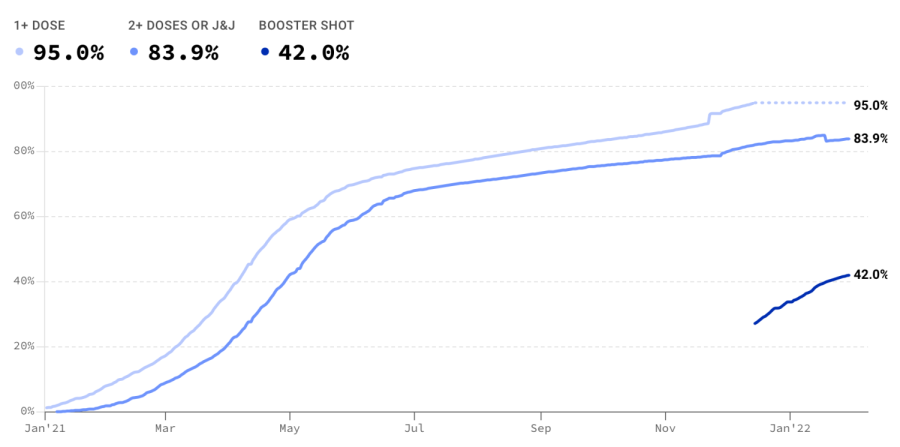Proposed vaccine mandates spark controversy
Photo courtesy of COVID Act Now.
A graph of COVID vaccines in Montgomery County, as of January 31st. The fight for mandates has been intense – and already high vaccine numbers have been a tool of the anti-mandate movement.
February 15, 2022
In the wake of vaccine hesitancy, large-spanning vaccine mandates have recently taken effect across the country. In early September, New York City became the first major city to require proof of vaccination to eat or drink indoors. In recent months, the policy has been expanded to include indoor dining, gyms and entertainment/meeting spaces
While other areas have passed large-scale vaccine mandates (not to mention the federal mandate for large businesses), other states have passed bills against these mandates. In late November, Florida passed a law banning vaccine mandates in schools and businesses.
Vaccine mandates are designed to get more people vaccinated, something that has not been as big of an issue in Montgomery County as compared with other areas. In Montgomery County, 83.5% of the population is fully vaccinated, compared with 72.2% of Maryland residents and 63.6% of people across the entire country
In recent weeks, Montgomery County has taken the first steps toward introducing a mandate of their own. First proposed at a public hearing on Jan. 18, the mandate would require proof of vaccination for bars, restaurants, gyms and “other covered establishments.” The resolution was requested by Montgomery County Executive Marc Elrich, and proposed a tiered mandate, with one shot required for ages 12 and above by Jan. 22, full vaccination (two doses of Pfizer or Moderna, one dose of J&J) for ages 12 and above by Feb. 15, and proof of a full vaccination for ages 5 and above by March 1.
The Montgomery County Council held a public hearing on the proposed mandate Jan. 18, with over 200 written testimonies sent in for review. Input was open to all Montgomery County citizens, and the testimonies were heavily skewed against a mandate. The meeting ended without a vote, with Council President Gabe Albornoz calling for another meeting on Jan. 25
“We want to be methodological and thought out about this process because [the mandate has] a lot of consequences,” Albornoz said.
Although the vast majority of public input at the Jan. 18 meeting was anti-mandate, the sample may be skewed. Public meetings like this encourage only the people with the most extreme views to show up, leading to some skew in the opinions heard. In a poll taken by a consortium of universities from October, support was high for a universal vaccine mandate, with 65% of Americans in support..
At the Jan. 25 meeting, more public testimony was taken, with every public speaker opposed to the mandate. The result was clear – the council showed very little support for the mandate by the end of the meeting.
“I am a big supporter of everyone being vaccinated and boosted,” Sidney Katz, a Montgomery County Councilmember said. “However, let me say very clearly that I’m opposed to this legislation.”
The biggest reason for the opposition given at the meeting was the threat that it could pose to business in the county. With current staff shortages, the extra labor required to check vaccine cards could add an extra hurdle to business
“I’m a former small business owner,” Katz said. “This would be absolutely unfair for any small business… they can’t afford to do what is being suggested.”
The council put off the vote after a clear majority of its members made clear that they would vote against a mandate. The issue is likely to pop up again, but as of now, it looks as if there will be no vaccine mandate in Montgomery County for the foreseeable future
Despite the high vaccination rates in the county, COVID-19 cases remain high. After the discussion concluded on the vaccine mandate, the council voted to extend the indoor mask mandate into late February. With the mask mandate extended, students should continue to wear masks in school, and get vaccinated.
“Obviously, vaccinations have been an important tool,” Albornoz said. “This is a complex issue.”


